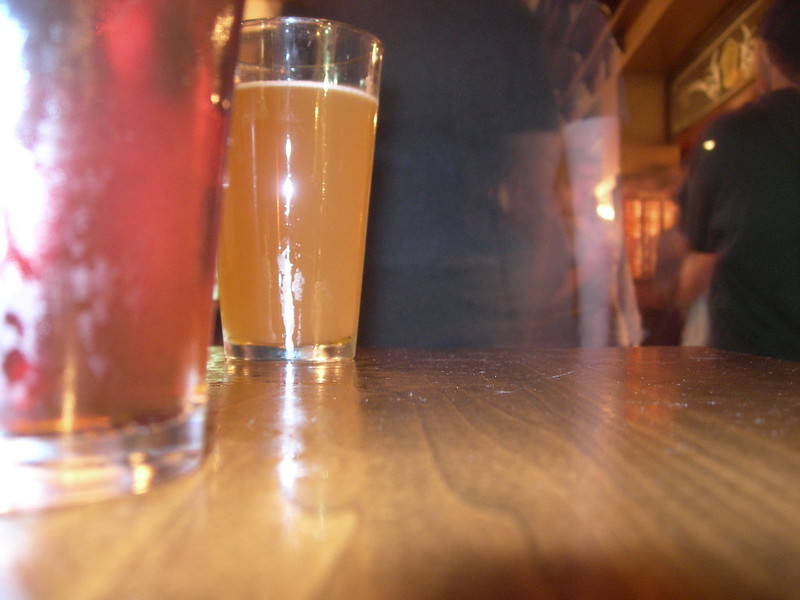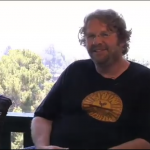
This interview takes place in a loud restaurant on a Monday night. All of us have a few beers we’re attending to. Noah leads the interview, for the most part.
Interview: How To Become an Executive Chef
Noah: Would you mind giving us an introduction and telling us who you work for?
My name is Nicolaas Burr. I’m an executive chef in Atlanta, Georgia. I’m the executive chef at a farmhouse restaurant. That’s what I do. We always have a good time.
Where were you at 22?
Where was I at 22? Wow. I was actually a Marine until I got out at 22 years old.
So at 23, where were you?
I decided that I wanted to be a chef. I actually tried to go to college, which was a complete disaster. I worked in a restaurant, as a lot of people do to get by. This is in upstate New York. I decided that I wanted to be a chef instead because I enjoyed cooking and the whole craziness of the restaurant business. My first real job, my first great job in the States was at a restaurant in Savannah.
A lot of people were surprised when I moved to Atlanta.
When did you study abroad?
In between the Marine Core and coming back to the States. That was basically a potato peeling job. I think any internship that you do, you do probably the lowest form of work. It’s more of learning intestinal fortitude and self discipline than learning how to be a chef.
I’ve worked for mostly European chefs. They’re all about self discipline. You have to motivate yourself.
You worked in Europe for three years. Were you making a lot of money?
About fifty dollars a week. Which is enough to take the Subway and eat some bread.
My family is from there. Most of my family on my father’s side live in Paris, in a town in the mountains. So I definitely had an advantage. Ever since being a child I’ve always had the best of food. My mother’s a great cook. I think Europeans, food is a big part of their culture. I would have to say that’s what influenced me as a child.
How important was it for you to work there, as opposed to making money?
It depends. One never starts in my type of career, and this is years ago. I’m not a child anymore. It’s changed over time. I’m 38 years old. I think back then, money was not important. And to this day, I do it more for the passion of doing it than for the money. I could easily sell out and work for a corporation. I could be the corporate chef of McDonald’s or Burger King or anything and probably make twice the amount of salary that I do.
But it’s the respect for food and love of creating it. The instant feedback from customers. It’s not like I sell you a car and six months later you’re not happy with it. You either like your meal or you don’t. It’s immediate gratification. I love that. I think instant gratification is part of every chef’s soul. The best ones of course, not so much the less than best ones.
It’s not an easy life. It’s not. It’s not what you think. It’s long hours. Forget about holidays. I’ve been divorced. I’ve been through so many relationships that probably ended because of my hours. Or because of my stress level. Or because of my drinking habits. Because a lot chefs work hard and play hard. God forbid that my kid every tries to become a chef (laughs). I don’t have children.
The thing we were talking about earlier with culinary school, is they promise and promise. It’s like the Air Force tells you you’re going to fly a jet.
What’s the difficulty? You have a lot of kids graduating from college and they’re 20 years old. They get out of college and want to go to culinary school and then, blank. What’s the problem? What’s the hardest part?
The problem is for anyone to run a school, you have to have a lot of people to run a school. As far as students. You have to have classes of students. 100 people a class? How many famous chefs are there? How many well known, successful chefs are there? There’s not a lot. It’s the fifth percentile. So as you can imagine, and at the same time, all of those people are borrowing fifty thousand dollars depending on the school to become a chef. But how many of them are actually going to ever see that money back?
I would say a large percentage of them give up. They get out in the world and go work at a restaurant in a kitchen and then six months later they’re like, ‘What the fuck was I thinking?’
So what’s the direct advice to people who did take the culinary school route and are trying to make something happen? You can’t fault them for taking out that fifty thousand dollar loan.
No I don’t fault them for that.
What’s your advice for them?
The ones who are graduating or the ones considering going?
The ones who just graduated.
The ones who graduated? It’s not what you know, it’s what you do. Anyone can read a book. My suggestion would be before they go to that step is to make sure they’re half decent at it. You either have a touch or a palette, or you don’t have a palette or a touch.
It’s like painting. I’m not saying it’s art, but it’s a craft. You can either cook or you can’t. You can’t learn to love the ingredients. You can learn passion. Passion is something that you have naturally. It’s not bought. It’s not sold. It’s not given to you. You can’t buy it on eBay.
So what’s the advice to people who are thinking about going to culinary school?
Make sure you really want to do it before you sign up. What I would suggest is to go work in a restaurant and find a chef and tell them you’re thinking about going to culinary school. Ask to work for them for nothing, if you can afford to do so. If not, work for whatever they’ll pay you. But learn what it’s about before you do it. Because a lot of these kids go straight from high school to culinary school and all of a sudden they’re in a restaurant. And it’s not a pretty world out there. When you start out you’re at the lowest of the lowest of low life forms. You’re in charge of the dishwashing area. You gotta have balls. You gotta have big balls.
What’s been the toughest thing in all of these years to overcome?
Probably a balance of quality of life. A lot of people are having fun, and you’re the one who is creating it for them. Sometimes it’s very tough, especially during the holidays. For me, not so much. But I really feel for my staff when it’s Christmas Eve or New Year’s Eve or Thanksgiving or Easter and they really want to see their family. You know that you have to be there to work. Someone has to feed people their turkey or goose or whatever they want. You know?
It really does make your personal life suffer. Like I said, I was married. It was very tough. My wife was actually the manager of my restaurant. It’s not a good situation to be in. But then again, I would have never seen her if she wasn’t. It’s a fine line between hard work.
As a chef, you’ll never find time to really settle down and enjoy your life. But my enjoyment of my life is doing what I do.
What’s one piece of advice you would give yourself at 21 or 22? Or 23 or 24. What’s the one thing that if you knew then that you know now that would have made your life that much easier? Preferably not wear a condom.
(Laughs) Stay away from hard drugs. Don’t depend on speed to get you through the day as a cook.
What I’m saying is that in the restaurant business, vice is everywhere. You can either become a casualty or you can become a success. That’s a very personal decision. I’ve been through my partying days. They’re not that long ago. It’s caused me to make some really great decisions. I’m not saying that I had a bad time. But there’s time for fun and there’s time for business. If you want to be a success, you have to be thinking about business from the beginning. Don’t just be a chef. Be a business person. Go take some classes in economics or business management. That’s what I would have done. Instead I opened a restaurant and learned the hard way.
Pay the government. If you owe the government taxes, pay the government the taxes (laughs). Fuck you IRS.
What kind of effect did the military have on you? Whether it was good or bad, most people I know in the military had some kind of profound effect on them.
I went into the Marine Core when I left high school. I had a week after I graduated. I went to Paris Island in South Carolina. Infantry. It probably, at the time, I needed it. I was very undisciplined as a kid. It was good for me. It gave me some self reliance. So when it came time to become a chef, I already had very much of a base of self discipline. I was very hardened. The kitchen is a very hard world. I’m sorry I’m boring you, sir.
What effected you more profoundly? What changed you more as a person?
Probably the military. That’s a very profound thing. But that’s a long time ago. I live for tomorrow and not for today. Or yesterday. I think I’ve been in the kitchen long enough to know my capabilities and limitations. I love what I do. I wouldn’t go back and change anything I’ve done.
So I got another question. The advice you gave about vices and being able to avoid vices is actually super good advice and very pertinent. Most people, especially at our age, get absorbed in that. When you say avoid hard drugs, it’s hard to just say that. What happened to you that you stopped feeling the necessity of going out and doing that as much?
Well, I guess, to be honest, I saw friends that I had go down. I think probably the pinnacle moment of that whole thing was a local chef, obviously his name isn’t going to be used, but we had an intervention for him. He’s a very dear friend of mine. He was stealing a lot of cocaine. I think everyone was doing a little too much. But some people can do it and not do it the next week. Some people can do it and they do it at work.
We had lunch one day and invited him to lunch. The guy knew as soon as he walked up there what was going on. He saw us all sitting around. We obviously had the look of ‘Hey dude. You fucked up. We need to talk about it.’ Unfortunately, he didn’t take too kindly to it. A couple of us decided that maybe it was a wake up call for us as well. That was it for me. After that day, I had no need for it. And I never really enjoyed it that much to be honest. I’d rather be high on Red Bull or coffee. (or my job, if you wanted to use this as the centerpiece for this piece, this would be a great last line.)
Something you could moderate a little easier.
Right. And it’s not just drugs. What is a drug? Cigarettes. Caffeine. Alcohol. Those are things embedded in the restaurant industry. Especially the alcohol. That would get out of control very quickly.






